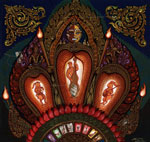Home » Jazz Articles » Interview » Jeff Richman: Solo Artist, Entrepreneur, or Chatterbox?
Jeff Richman: Solo Artist, Entrepreneur, or Chatterbox?
I definitely approached his [Coltrane's] music with respect...time and thought. I wanted each song to retain his unique stamp while adding my own element to it.
 Guitarist Jeff Richman has worked in the highest echelons of electric jazz for the last two decades, distinguishing himself over a productive career that has spawned more than twelve solo titles and twice as many guest appearances. Recently, he's found a new niche; mastermind producer / arranger / player / instigator of the electric jazz tribute/compilation. Jeff has spearheaded no fewer than three ripping, yet somehow discerning, paeans to Miles, 'Trane and Mahavishnu issued, it seems, en masse,in the last year. Funny, he 's also recently found at work on, but not at the helm of, the two Jimi Hendrix tributes/compilations on Comet Records and a just-released homage to Master Beck, entitled The Loner, on ESC records. The last three mentioned indicate that Richman's roots, no doubt, grow out of the rock gods he admired in his youth.
Guitarist Jeff Richman has worked in the highest echelons of electric jazz for the last two decades, distinguishing himself over a productive career that has spawned more than twelve solo titles and twice as many guest appearances. Recently, he's found a new niche; mastermind producer / arranger / player / instigator of the electric jazz tribute/compilation. Jeff has spearheaded no fewer than three ripping, yet somehow discerning, paeans to Miles, 'Trane and Mahavishnu issued, it seems, en masse,in the last year. Funny, he 's also recently found at work on, but not at the helm of, the two Jimi Hendrix tributes/compilations on Comet Records and a just-released homage to Master Beck, entitled The Loner, on ESC records. The last three mentioned indicate that Richman's roots, no doubt, grow out of the rock gods he admired in his youth. But what has always distinguished Jeff Richman among his peers is his harmonic path through his runs, shred lightly, if you will, with a sophisticated jazz approach finding angular, yet very lyrical pathways through the simplest or most complex changes. Oh yeah, he's written some pretty mean vamps, slick turnarounds and catchy melodies as well. Long a fixture on the LA guitar and fusion scene, a solar system revolving, in this case around a Potato (LA's "Baked Potato"), Jeff's come up alongside some very highly regarded six-stringed peers. He also tends to attract some pretty heavy cats to join him on his recording and live sessions , including the likes of bassists Jimmy Haslip, Gary Willis, and Abe Laboriel, keyboardists Russell Ferrante, T Lavitz and (renowned producer) Peter Wolf, and drummers Vinny Colaiuta, Steve Smith and Simon Phillips. Jeff's got his own band as well, and it's populated by some equally heavy cats. Let's not even list all the incredible guitarists he's played with, or enlisted for these latest projects. More important to emphasize that Richman stands shoulder to shoulder with any of them, with the current flurry of activity bringing some well-deserved, and overdue, notoriety along with it.
But some of the neatest stuff about Richman runs counter to what you'd think reading these intro paragraphs. For instance, he's recorded for English pop icon Cliff Richard, toured with the Manhattan Transfer, and played on the soundtrack for the Tom Hanks Rock'n'Roll movie, That Thing You Do. Some surprises are even more personal, which is our cue to let Jeff speak for himself.
Allaboutjazz: As a point of introduction, I'd like to let you know that AAJ just doesn't send just anyone on these interview missions Jeff. I must admit I am the proud owner of Himalaya on vinyl.
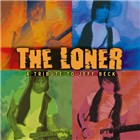 Jeff Richman: That was released in 1986, almost 20 years ago-unbelievable. I just made a CDR of that the other day, so I've listened to it recently. There's some good stuff on there with Gary Willis and Vinnie Colaiuta. That one has "Pygmy People," which has a very cool vibe on it, a great groove. I usually don't play it anymore but I used to all the time. I just recorded it again for another album (NOTE: the just-released The Loner , a tribute to Jeff Beck released on esc records).
Jeff Richman: That was released in 1986, almost 20 years ago-unbelievable. I just made a CDR of that the other day, so I've listened to it recently. There's some good stuff on there with Gary Willis and Vinnie Colaiuta. That one has "Pygmy People," which has a very cool vibe on it, a great groove. I usually don't play it anymore but I used to all the time. I just recorded it again for another album (NOTE: the just-released The Loner , a tribute to Jeff Beck released on esc records).
AAJ: You've been associated with these monster musicians like Vinnie for many years.
JR: I went to college with him and I hung out with him kind of before he hit big. Now I don't really hang out so much, but if I can get him on something, if he's available, it's just a treat to get him
AAJ: I'm surprised already. I didn't realize you went to Berklee. In my mind you are a west coast guy all the way.
JR: Yeah, well, I went to Berklee. That's where I met Phil Giffin, the guy that's produced all my records. What a great experience! I hooked up with Mike Stern, Pat Metheny, and Bill Frisell, all those people.
AAJ: Just curious, do you happen to remember Randy Roos?
JR: Oh, yeah. I saw him with that band he had all over the place.
AAJ: Orchestra Luna?
JR: Yeah, he was incredible. When I was going to Berklee he was already, like, just doing it.
AAJ: Still is. So, I'm still reeling from the fact you're yet another amazing player who was at Berklee at that time. How did you end up back on the west coast?
JR: I moved to New York after Boston. Let's see I was in Boston from '73-'76 and then I was in New York from '76-'79, another three years. I was having a good time in New York-one of the gigs I got that was really cool was Ray Barretto. What was especially cool is that I started writing music for that band. The first album I ever played on was a Ray Barretto album and I got four of my tunes on there. It was a record called , Can You Feel It. You probably can't even get it—it's probably impossible. It was on Atlantic Records—I think he did two records on Atlantic. That was a great gig.
I just got enough of New York y'know? I grew up in Hawaii...
AAJ: Really?
JR: Well, actually I grew up on the east coast and we moved to Hawaii when I went to High School, so I was just so used to better weather. There was just one summer in New York when I'd had enough of it that I went out to LA. See, before the Barretto gig I got a gig with Flora Purim and Airto and that was out in LA, with Jimmy Haslip and Ricky Lawson (note: that's the Yellowjackets original rhythm section).
AAJ: Wow! Like I said, you have been associated with the best of the best forever. Well, more like two decades anyway.
JR: Actually when I auditioned for that gig, I had come out to audition for George Duke's band, but he already had a guitarist, so he turned me on to the Flora gig.
The day I auditioned for that gig was the first day Ricky Lawson and Jimmy Haslip had met! The three of us all auditioned together for the gig, and we all got it. So I was out on the west coast and I lived there for about a month or two, where we rehearsed. Then we did this whole tour. After that is when I came back to New York and played with Barretto.
AAJ: No wonder you can smoke all kinds of grooves, including authentic Afro-Cuban and Latin stuff.
JR: Oh yeah. While I was with Ray for that year , I kind of fantasized about living in LA because it was the best of both worlds, a music center with the great weather of Hawaii. That's what made me do it but I have to tell you, I've regretted it for years and years; even to this day I have some regrets because moving from New York was kind of moving from...it was better in New York ultimately.
AAJ: This is what makes interviews important. I would never have expected to hear that from you. You mean music-wise, right?
JR: I think as much as I like LA and I'm still here, it's more political here. There's this kind of thing here where it's just impossible to get in on the scene. It's even still impossible to get in on the studio scene. Whereas, in New York, it's still more like if you just do a good job and you're a good guy, you eventually y'know ..get in.
AAJ: Right now, as an observer from afar, it seems like the incredible shrinking New York jazz scene.
JR: But that's what everybody says all along. I think it's always like that. I think if you get to New York and you start hangin' out, things start happening eventually. Even though it might seem like it's more difficult to break into New York, my opinion is that it's more difficult to break LA. It's just way more spread out and there's not enough radical shit going on. I'd say as a good musician living life in New York , there's more of a chance of things happening for you than in LA. But I'm still here and it's still pretty good, although I find myself fantasizing about getting back to New York.
AAJ: I see that your doing a bit more than fantasizing. I've seen the listings in AAJ New York for your gigs there lately.
JR:Occasionally, I'll try to get some gigs there, like at the 55 Bar. Right now, I'm hoping to get some Blue Note gigs to promote these albums, and they seem to be receptive to that.
AAJ: It's funny, you're touching on the New York versus LA thing much differently than I'd intended to do it. I think most people, including myself, perceive LA as the fusion-y type of electric jazz and the New York thing is the more straight-ahead or modern jazz.
 JR: You could look at it that way, but LA really isn't the fusion scene anyway, it's the pop-rock scene. There's only a couple clubs here, like the Baked Potato, which is obviously the best club. The Baked Potato is better than New York, but it's only the Potato. Without it, I don't know what I'd do. I play there about once a month—I just do whatever I want and I get different people to play with me.
JR: You could look at it that way, but LA really isn't the fusion scene anyway, it's the pop-rock scene. There's only a couple clubs here, like the Baked Potato, which is obviously the best club. The Baked Potato is better than New York, but it's only the Potato. Without it, I don't know what I'd do. I play there about once a month—I just do whatever I want and I get different people to play with me.
AAJ: Different people? That's putting it mildly (laughs). You get the best-of-the-best of the LA cats, man, Abe Laboriel, Simon Phillips, Vinnie, Forman, Brandon Fields, Haslip, Gottlieb—it's nuts! The activity is like exploding it seems.
JR: Y'know what? It's been happening all along, really. I feel like I really haven't made it yet, man.
AAJ: But the recorded output has exploded as well!
JR: Yes, but... we'll talk about that, but I gotta tell you man, it's still hard to get gig! I can't get a tour happening in Europe, I can't get anything happening in Japan, and it seems like there are still all these guys like Henderson, Frisell , Sco and Stern who are killing it all over the world and I'm, like still, really the underdog.
AAJ: Well, there you go Jeff. You have simply summarized why we needed to do this interview. To my mind you're as good or better than any of those guys, you've been doing it just as long or longer and yet it seems like something more needs to happen for you to get some name recognition, publicity, notoriety, whatever you want to call it.
JR: Somehow I'm not at their level yet. I'm working and those three new albums I've produced are totally happening and getting some notice, and I've got another one out like right now, but... something more needs to happen. Even though I feel like I am where I should be and I'm not complaining it just seems like it should fall into place a bit easier.
AAJ: There are other guys you play with in the same boat.
JR: When I think of guys that should have more notoriety, its Joel Taylor, who is one of the best drummers I have ever played with; in fact, I'll go on the record as saying he is my favorite drummer to play with. He should be frikkin' famous! He is so deep and he has perfect pitch and he can do anything.
AAJ: Holdsworth likes him too, eh?
JR: Yes.
AAJ: So listen , I wanted to ask you about teaching, because somewhere, I still have your instructional tape that you made years ago. Even then, you were one of the guys that could really cut right to the heart of some ways to simplify the thought process to get some great lines, like the lesson portion regarding your triadic approach. Your playing then, as now, was super lyrical and musical, and the stuff you taught brought that out.
JR: I've loved teaching and I have loved the students that I teach. I was involved early on the GIT thing and I still am. I started there between ten and fifteen years ago and the school's about 20 years old. Now I teach there only a few hours.
I also teach at the LA Music Academy, LAMA, and I love it there too. I'm more involved and more situated in the heart of the thing there. The great thing about teaching at these schools is that when I have an engagement, like I do next week in Brazil, for instance, I get someone to sub for me and it's not a problem. The more corporate teaching gigs at Universities—you're just more stuck to that job.
Right now, though, at this point in my career, I feel like I have to move on, but practically, I can't let it go yet. Slowly, I'll be able to do more of what I really love.
AAJ: Regarding the Brazil trip, are you going there to do Brazilian music?
JR: Not really, no. This trip is through a school, in conjunction with the American Consulate, as a little couple-day clinic. Also, at the end of the month Jimmy Haslip and Chad Wackerman are going to Russia.
AAJ: Nice, band—like your Trio Loco record with Wackerman instead of Gottlieb. Yet another great project from you.
JR: I'm very proud of that record—I feel it is very much a band project.
AAJ: Another facet in your expansive career. So, you've put together all these great new records, these tributes, with all these great players. Is Varney the guy behind that?
JR: Yes he is. He's really the guy behind it and he deserves a lot of credit. How I got introduced to him is basically through Steve Smith. I started recording some of those Baked Potato gigs years ago. It was a real effort to get the recordings right and I don't do it anymore, and, as it happens, a couple of the guys weren't happy about me recording them when I did. But, I realized that I had some potential with a project there because I got these guys to play with me, we had it on tape, and some of these guys have gone on to greater degrees of notoriety. In other words, they're more famous!
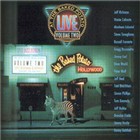 So I presented the thought to Varney, and Mike is a concept guy you know, so he was really cool. He loved it and worked on it and financed it all, the Live at the Baked Potato Volume I and II. I've always wanted to do this—I enjoy making records and I've fantasized about it since being a kid. I was so happy doing it that I really worked closely with him, and I think did a really good job bringing it in. I had to have everybody sign contracts, which was just an unbelievable pain, but I actually did it—like a little workhorse for the label.
So I presented the thought to Varney, and Mike is a concept guy you know, so he was really cool. He loved it and worked on it and financed it all, the Live at the Baked Potato Volume I and II. I've always wanted to do this—I enjoy making records and I've fantasized about it since being a kid. I was so happy doing it that I really worked closely with him, and I think did a really good job bringing it in. I had to have everybody sign contracts, which was just an unbelievable pain, but I actually did it—like a little workhorse for the label.
AAJ: So you financed the up-front costs of Live at the Baked Potato records yourself up until Varney's involvement?
JR: I recorded it, I'd pay the engineer, but the musicians didn't get paid until we made the record deal. Then there's a lot of mixing and editing; for instance, there were some jams that were twenty minutes long we edited down to eight minutes. I feel like both of them capture unique moments in time that will ever happen again, and I couldn't recommend which of the two Potato recordings is better. On each album there are eight songs and to me, on each, three of the eight are just magic.
AAJ: Yeah, I always like to nail down interviewees for what they think is their best work, so go ahead.
JR: On the first one, "Eight's Gonna Wait" is in my opinion, phenomenal, because Mitch Forman took the best solo on the whole album. Mitch is one of my best friends.
AAJ: He is a bad cat.
JR: He is my hero, baby. The next tune after that "Monkfish," is just magic, with Chad Wackerman, Jimmy Haslip and Brandon Fields, and—you asked—I thought I sounded great on that! "Seven Stars" is a Russell Ferrante tune, that is just such an incredibly great tune.
On Volume II, "Leap of Faith, " which is a Jeff Beal tune just came out really special—these days he's really focused on film and TV music. "Let This be the One," with Dave Weckl, just rocked and on "On the Trail," which is an old, almost country and western type tune, the playing an arrangement are fantastic.
AAJ: So how'd these recent three tribute CDs evolve so fast?
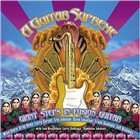 JR: Well, Varney said he was thinking of a Coltrane CD and he said, "I'd like you to produce it because I like what you did with the Live from the Baked Potato CDs." And I said, "Of course!" That's how this all started, these recent three compilations, or tributes. He was so ecstatic about the Coltrane results that he immediately wanted to do two more. He'd always wanted to do a Mahavishnu one, which I agreed to do, but I wanted to do a Miles one even more. It was my idea to do the Fusion for Miles and he went for it. I'll tell you, I'm never going to do two albums in a row again—it was just way too stressful. I had to do them almost like, together, but it's way to hard.
JR: Well, Varney said he was thinking of a Coltrane CD and he said, "I'd like you to produce it because I like what you did with the Live from the Baked Potato CDs." And I said, "Of course!" That's how this all started, these recent three compilations, or tributes. He was so ecstatic about the Coltrane results that he immediately wanted to do two more. He'd always wanted to do a Mahavishnu one, which I agreed to do, but I wanted to do a Miles one even more. It was my idea to do the Fusion for Miles and he went for it. I'll tell you, I'm never going to do two albums in a row again—it was just way too stressful. I had to do them almost like, together, but it's way to hard.
AAJ: What tracks stand out for you on the Coltrane disc?
JR: My favorite track is, of course, the one I played on, "Afro-Blue." The way Mike Stern played on "My Favorite Things," is just really special.
AAJ: How about in terms of arrangements?
JR: You know, it's really weird. I do all these arrangements and there's certain arrangements that just work really well live. "Equinox" is a great arrangement and translates into a great live tune.
AAJ: While the Miles tribute is a daunting task, Coltrane seems like an even more sacred figure to take on. Does the sort of "sanctity" of the Coltrane book come into play when addressing head-on this approach to his music, or do you have to put that sort of concern aside?
JR: I definitely approached his music with respect, care with plenty of time and thought. I wanted each song to retain his unique stamp while adding my own element to it. I was very pleased to find out that after the record was done Alice Coltrane listened to it and said the she really liked it!
 AAJ: Of all the guitarists on the Miles record, I know the one I revere the most is Pat Martino. I'm sure you feel the same way. Tell us what it was like getting Pat Martino to do the date and maybe some of the details around why you picked his particular tune and arrangement.
AAJ: Of all the guitarists on the Miles record, I know the one I revere the most is Pat Martino. I'm sure you feel the same way. Tell us what it was like getting Pat Martino to do the date and maybe some of the details around why you picked his particular tune and arrangement.
JR: Getting Pat Martino was a shot in the dark; I just called his manager to see if he would be interested and available. They said yes—I was ecstatic! I picked that tune for him because it was a be-bop jazz tune with some nice chord changes; I thought it would be appropriate for Pat since he plays over changes so well. Pat was a real gentleman, kind, sweet, personable. I couldn't have been nicer or easier to work with!!
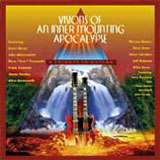 AAJ: On the Mahavishnu disc, how important was it to the project to have the two ex-Mahavishnuites on there, Forman and Goodman, as well as ex-McLaughlin bassist Kai Eckhardt? They must have added great insight.
AAJ: On the Mahavishnu disc, how important was it to the project to have the two ex-Mahavishnuites on there, Forman and Goodman, as well as ex-McLaughlin bassist Kai Eckhardt? They must have added great insight.
JR: Truthfully, it just happened that way almost by accident, Mitchel is one of my best friends and favorite keyboard player. I would have asked him even if he hadn't played with Mahavishnu. Kai was actually a last minute decision—the original bassist that was going to do it had to cancel about a week before the session! I think the important thing was that I got Jerry Goodman! An original band member!
AAJ: I know John McLaughlin actually attended a recent Mahavishnu Project gig in New York. Has he given you any feedback on the tribute?
JR: I only heard from the owner of Abstratlogix that John really liked the CD!
AAJ: Before the latest involvement with Shrapnel, or Tone Center, how many CDs had you done?
JR: All together , I've done twelve. My latest solo CD is called One, Two, which is short for twelve—that includes the Baked Potato CDs.
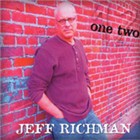 AAJ: I particularly enjoyed "Sand Dance," which had some real tasteful bass work from Dean Taba, a fellow Hawaiian. Did you know him from Hawaii?
AAJ: I particularly enjoyed "Sand Dance," which had some real tasteful bass work from Dean Taba, a fellow Hawaiian. Did you know him from Hawaii?
JR: No, I met him in LA and funny you should ask, he just moved back. I have a pretty healthy back catalogue, and as they go out of print, I'm thinking I should put out a compilation of some of those CDs—there's so much material to draw from with a Best Of type of thing.
AAJ: You also have a very fresh new product. Tell us about it.
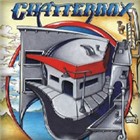 JR: I just completed my latest record, called Chatterbox. My favorite band is that band. The guy that financed it basically said, "Jeff, I love your guitar playing, I love your music, and I'd like to try to get you to go in more jamband direction, to see how that scene might receive you. I want you to get together your favorite band and make a record." I immediately picked Mitch, Joel and Dean. There are three or four jams on there that we improvised right on the spot, which turned out incredible. Then five of my tunes. The jams are totally unedited, and we stretch way out, and they're killing. The drum sound on the records are unbelievable, the engineering is unbelievable, and Phil produced again.
JR: I just completed my latest record, called Chatterbox. My favorite band is that band. The guy that financed it basically said, "Jeff, I love your guitar playing, I love your music, and I'd like to try to get you to go in more jamband direction, to see how that scene might receive you. I want you to get together your favorite band and make a record." I immediately picked Mitch, Joel and Dean. There are three or four jams on there that we improvised right on the spot, which turned out incredible. Then five of my tunes. The jams are totally unedited, and we stretch way out, and they're killing. The drum sound on the records are unbelievable, the engineering is unbelievable, and Phil produced again.
AAJ: Will you tour behind this new CD?
JR: Well, it would be great but there is no promotion behind the record at this point. It just came out, but that's what I mean—I just haven't hit.
AAJ: You've hit with a certain audience.
JR: Y'know what it is? It's this. The people that are in the music scene—they know who I am, OK? Guitar players, drummers, musicians, but I don't have a name , it seems, big enough to play some places.
AAJ: You should. You're as good as any of these guys with a bit more name recognition.
JR: Well, thank you. And I know I have something to offer and definitely, if I presented myself in the right light it would be just as valuable.
AAJ: It already is just as valuable, it just seems to be a matter of people hearing it.
JR: A great example of that is the Chatterbox album. It's probably the best album I've ever done. It should have been released on Verve and we need to be on the cover of Downbeat or Jazztimes, but we can't get that kind of push together.
AAJ: Major labels really do help, huh?
JR: I guess. For instance, Scofield comes out with an album and his face is on the cover of Downbeat. How'd that happen? I can't even get one line in Downbeat. How they hook that up, I don't know.
AAJ: I think it's the direct relationship between the publication and the publicist. It's not even up to the journalists. Incessant gigging seems to get some magazine attention as well. Please come gig in Boston.
JR: My good friend T Lavitz is up in Boston now. We'll have to hook something up there. He moved from Atlanta to LA awhile ago, but he just moved to Boston about a year ago. A great guy and great player.
AAJ: He made a great solo record with Jimmy Herring and Oteil Burbridge on it.
JR: Oh, yeah. Jimmy Herring man, what a fantastic player. T Lavitz just made a record for Varney with Jeff Berlin, Dennis Chambers and Dave Fiuczynski.
AAJ: Wow! Varney does stuff quick. As a result of these new recordings, will you produce other people's stuff, too?
JR: Not really. I've just gotten into these recent ones through Mike Varney. He wants me to produce another one. No one has really asked me to produce anything else for them, but it's another facet I'd like to explore more.
AAJ: Has the internet helped you with all this stuff?
JR: Abstractlogix and Audiophile Imports have helped us sell a lot of our records.
AAJ: So I wanted to ask you the influences question
JR: My major influence on guitar is Jeff Beck bar none. My mom was a folk guitarist and she taught folk guitar. I was really excited by the Beatles and the Stones because I was in LA at that time, where I am now. The Ventures really blew me away because it was two guitar players doing instrumental music. But then Jeff Beck changed my life!. When I hear him with the Yardbirds, it was this frantic kind of vibrato, and when you put that together with his tone, it just ripped my soul open. I would listen to those solos on Having a Rave-Up. Even the tunes with no solos—every Yardbirds single had an amazing Jeff Beck thing on it. Then I bought his first record, Truth which was just unbelievable. He pretty much just destroyed me.
That's when I moved to Hawaii, where I got into a cover band, and we started doing Hendrix tunes and Allman Brothers tunes. Then, I remember, I got Bitches Brew and a record by the Crusaders and I started realizing there was just way more to music than just rock. When I got into my college years, I applied to Berklee, got accepted, went over there and got totally into jazz. I was lucky because Frisell, Stern and Metheny were there and I got in on that scene. I wasn't that good, but I got in on that scene and I managed to practice and struggle a lot.. ..
AAJ: Hey! You are that good. You're one of those guys.
JR: Back then, those guys were better. Stern and I became really tight for some reason—we just really connected. He actually helped me a lot, and I also learned a lot from Metheny—I took lessons from him weekly for awhile. I was really influenced by him. I also studied with Mick Goodrick, who is the best teacher. His approach was more balancing for me.
AAJ: I'll say it again, here is a guy as good if not better than any of those west coast guys , even though we've found out here that you're not really a west coast guy, and somehow he really doesn't get the proper notice.
 JR: Y'know what? It's just gotta get more out there. Live playing is one way to get known, But you still really have to have some kind of viable distribution arm and promotion arm to get stuff out there.
JR: Y'know what? It's just gotta get more out there. Live playing is one way to get known, But you still really have to have some kind of viable distribution arm and promotion arm to get stuff out there.
The other thing is just to get some kind of hit. Like, for instance Medeski, Martin and Wood. Do you remember that album they did called Shackman? A friend lent it to me, so I was driving in my car digging it and thinking, "This is good, it's cool." So then I had to give it back to him after a day or two. And it was like this weird thing, man. It was kind of like, "I have to have my own Shackman. I need to have this for like, my life" (laughs). I almost unconsciously went to the record store and bought it. There was just something about it that made you have to have it. It was unexplainable. That's a hit—after you get one, you're in.
But everything considered, it's supposed to be exactly how it is—it's coming. Somehow or another I remember looking at this astrological thing, some book I had, and I remember that my card was "Earned Success." It was like this weird, tarot thing. Maybe that's just what it is—kind of like a long haul that was deserved and earned that just took a long time to get me into a place of... that I don't know, is whatever it is you want to call it.
Selected Discography
Various Artists, The Loner - A Tribute to Jeff Beck (ESC Records, 2005)
Various Artists, Fusion for Miles (Tone Center, 2005)
Various Artists, Visions of an Inner Mounting Apocalypse) (Tone Center, 2005)
Various Artists, A Guitar Supreme (Tone Center, 2005)
Various Artists, Gypsy Blood: A Tribute to Jimi Hendrix, Vol. 2 (Horizon, 2005)
Jeff Richman, Chatterbox (Independent, 2004)
Jeff Richman, One, Two (Independent, 2004)
Various Artists, Voodoo Crossing: A Tribute to Jimi Hendrix (Horizon, 2003)
Terri Lyne Carrington, Jazz is a Spirit (ACT, 2002)
Jeff Richman/Jimmy Haslip/Danny Gottlieb, Trio Loco (Independent, 2001)
Jeff Richman & Friends, Live at the Baked Potato, Vol. 2 (Tone Center, 2001)
Jeff Richman & Friends, Live at the Baked Potato, Vol. 1 (Tone Center, 2001)
Robbie Krieger, Cinematix (Oglio, 2000)
Jeff Richman/Wayne Johnson, Apache (Miramar, 1999)
Jeff Richman, Sand Dance (Alchemy, 1998)
Jeff Richman, Last Arrival (Lipstick, 1996)
T Lavitz, Gossip (Wild Cat, 1996)
Jeff Richman, Blue Heart (Kiss of Music, 1994)
Vital Information, Global Beat (Columbia, 1987)
T Lavitz, From the West (Passport, 1987)
Jeff Richman, Himalaya (Passport, 1986)
Tom Coster, T.C. (Fantasy, 1981)
Ray Barretto, Can You Feel It? (Atlantic, 1978)
Photo Credits
Color Photos: Hiroshi Mochizuki
Black & White Photo uncredited.
Tags
PREVIOUS / NEXT
Support All About Jazz
 All About Jazz has been a pillar of jazz since 1995, championing it as an art form and, more importantly, supporting the musicians who make it. Our enduring commitment has made "AAJ" one of the most culturally important websites of its kind, read by hundreds of thousands of fans, musicians and industry figures every month.
All About Jazz has been a pillar of jazz since 1995, championing it as an art form and, more importantly, supporting the musicians who make it. Our enduring commitment has made "AAJ" one of the most culturally important websites of its kind, read by hundreds of thousands of fans, musicians and industry figures every month.



